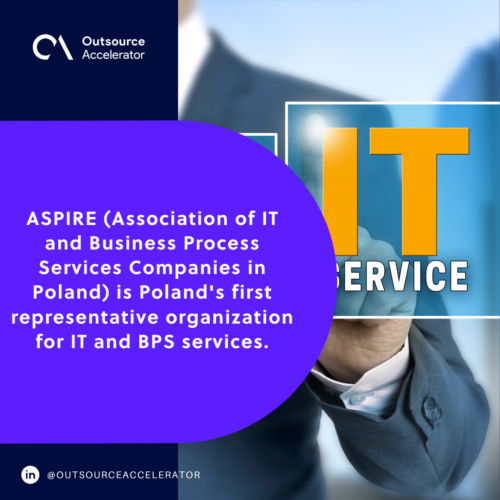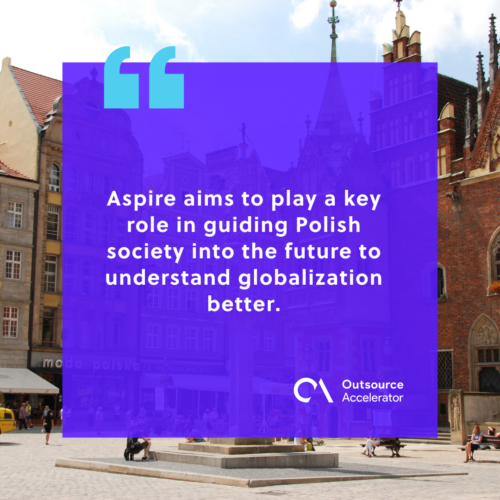Association of IT and Business Process Services Companies in Poland (ASPIRE), Poland
Definition
What is ASPIRE?
ASPIRE (Association of IT and Business Process Services Companies in Poland) is Poland’s first representative organization for IT and BPS services.
It is a collaboration between South Poland Business Link and the major Business Process Outsourcing (BPO) and Shared Services Centers (SSC) enterprises in Krakow, Poland.
ASPIRE was founded in October 2008 and headquartered in Kraków, Poland, the major IT and BPS hub in Central and Eastern Europe, with 25 global corporations employing 16,000 people.
Poland city surveys capture the BPO and SSC market, research, and action planning on main problems that influence the IT and BPS business model, such as transportation and education.
Professional development for the IT and BPS sector is among the services provided by ASPIRE to its members.

Their goal is to lead the way in building a supportive environment for the economy, which they believe represents the region’s most significant opportunity to compete in the global economy now and in the future.
It involves exchanging information among ASPIRE members and with local stakeholders and active industry promotion and strong representation.
Outsourcing has emerged in Poland, four to five years after the country joined the European Union. Still, the government, universities, and other stakeholders have been reluctant to acknowledge the industry’s potential and economic worth.
Can Poland emulate India in Business Process Outsourcing?
While India has welcomed the industry and tried to create an atmosphere that allows it to grow, Poland has remained an overall passive receiver.
There are various reasons for this, including a leaning toward commodities rather than services. There are also perceptions that job opportunities within the outsourcing industry are not the nature of work graduates want to perform. These are some things ASPIRE wishes to improve.
The association aims to play a key role in guiding Polish society into the future to understand globalization better.
Their goals are similar to India’s National Association of Software and Service Companies (NASSCOM). It is to function as a catalyst for the growth and progress of India’s software-driven IT industry.
What are the factors responsible for turning Poland into the next hot destination?
The admission of Poland to the European Union in 2004 had a significant impact on the country.
Outsourcing in Poland and other CEE accession nations has truly taken off since this era. Political stability and legal and administrative alignment with Western European economies were essential.
Implementing an open sky policy and a rise in direct, low-cost flights between European locations preceded the European Union’s membership. As a result, many Polish towns with international airports have become more accessible to European commerce.
Initially, capital cities such as Budapest, Prague, and Warsaw received equal investment. Still, Krakow, Poland’s second-largest city, could leapfrog these other cities due to a lower cost base.
Poland is also significantly larger than other accession countries, with 40 million people, much exceeding the combined population of all the other 2004 accession countries.
In comparison to other Central and Eastern European nations, Poland has many urban centers, which appeals to BPOs with numerous locations.
Companies frequently made the first wave of Shared Services Centers (SSC) investments with existing manufacturing operations.

What are the current challenges for the outsourcing industry in Poland?
Acquiring a new business is one of the immediate challenges. Companies are expanding, but they, like everyone else, are under pressure to keep expenses under control.
Growth has slowed in the first half of 2009, which might indicate that businesses have excess capacity.
On the other hand, the slowdown has taken some of the stings out of the market—turnover rates dropped, and rents are restructured as much new space becomes available.
There are also issues with employee expectations. The business has developed so rapidly in such a short period.
Promotions have become the norm in every industry. That’s why there are new concerns in the field of human resources.
The moderate problems are those I’ve already stated. As the economy improves, pressure on left-of-field languages will increase, requiring the development of new solutions.
For ASPIRE, the ultimate goal is to create capability by building a shared vision for the sector that stakeholders will embrace.







 Independent
Independent




